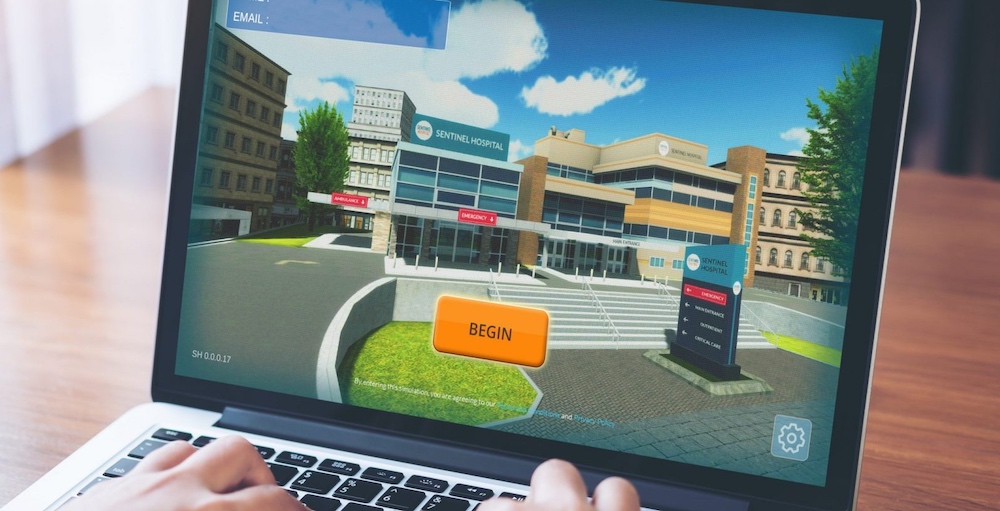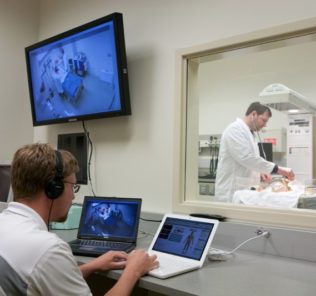Sentinel U Virtual Telehealth Training Series Prepares Learners for Modern Healthcare
Sentinel U, a division of American Sentinel University, recently introduced virtual telehealth training clinical simulations to provide new and experienced nurses with opportunities to practice their skills. The company has been building digital learning resources and virtual healthcare simulations since 2015, but this new virtual training technology aims to specifically enhance a nurse’s ability to deliver remote healthcare — such as assessing, monitoring and evaluating patients’ ongoing care. The goal of the simulations is to improve access to care, support patient-centered outcomes and enhance telehealth visit efficiency across the healthcare system.
Before the year 2020, the term “telehealth” was only vaguely familiar to some people. Yet, over the last 11 months, healthcare providers everywhere have had to quickly adapt and connect with patients virtually to monitor and diagnose healthcare issues. In fact, according to the nonprofit FAIR Health’s Telehealth Tracker, there’s been a 3,060% growth in telehealth claims nationally between October 2019 and October 2020.
Yet, this increase in telemedicine usage has been met with a challenge: few healthcare providers are telehealth experts. While this new healthcare option is convenient and ideal during the pandemic, there is much to be learned on the part of healthcare providers. For example, how can physicians and nurses provide the best care possible in a virtual telehealth visit setting? How can they assess patients’ needs and deliver quality care regardless of the challenges presented by electronic technology?
Sponsored Content:
The virtual telehealth simulation series offered by Sentinel U offers four unique clinical simulation settings in which a telehealth visit is conducted. These settings include medical-surgical novice, pediatrics, maternal/OB and mental/behavioral health. The learner conducts virtual office visits with a remote patient, reviewing data and opting to select telehealth tools to monitor specific parameters. Learners delve into interpreting alerts; developing clinical judgment and communication skills for assessments; remotely monitoring and evaluating patient safety, and more.
“With COVID-19, more patients than ever are embracing telehealth, but it is important for nurses and nursing students to receive training on how to provide the best care to patients when they aren’t standing physically in front of them,” says Christi Doherty, DNP, RNC-OB, CNE, CHSE, director of academic simulations for Sentinel U and associate professor of nursing American Sentinel University, who helped create the content for the telehealth virtual clinicals. “With this product, we wanted to offer four specialties to address how nurses can provide this kind of care in different healthcare settings.”
Sentinel U’s Director of Empowered Classroom for Sentinel U, Melissa Penner, who is also an associate professor of nursing at American Sentinel, helped create content for the telehealth series as well. She agrees that being able to add virtual clinicals also explore the importance of patient education and empowerment.
“As we get into specialty populations, family support comes into play too,” Penner says. “In one of the virtual clinicals, there is a diabetic patient whose brother helps her use a glucose monitor. There are many family dynamics to prevent readmission, so we like to teach students to utilize the resources patients have at their homes, including family members.”
Sponsored Content:
Learning the Suite of Telehealth Tools
In the Sentinel U telehealth clinical series, learners become familiar with all of the healthcare simulation resources they need to later provide quality clinical care and professional health education using the computer. This includes electronic data and telecommunications technology, videoconferencing, remote patient monitoring and mobile health. The learner will choose from 10 different devices to assess and monitor patients, and practice steps of implementing and conducting virtual patient visits.
To be used as a model for healthcare simulation standards, Sentinel U’s products are all created by nurses, for nurses. This development process has helped the company create product distinction throughout the virtual clinical simulation industry.
“Our leadership has invested in quality nursing leadership and oversight, and we definitely focus on the standards of care put forth by the American Academy of Ambulatory Care Nursing,” Doherty said. “There is no telehealth nursing certification, but the ambulatory care nursing certification addresses much of the telehealth nursing content. The Telehealth clinical series is an excellent way to help nurses educate themselves on this kind of care that has become more prevalent — and will continue to be so.”
“Sentinel U takes a lot of pride in creating products that are a model for simulation standards,” added Jeffrey Caplan, president of Sentinel U. “Our Telehealth series is in-depth and immersive, and allows learners to practice virtual healthcare in a supportive setting. As telehealth has grown dramatically and continues to, we strive to create virtual scenarios that help nurses build skills in the realm of telehealth services to different patient populations.”
Upcoming Webinar: Sentinel U is presenting a “Virtual Clinicals and Simulations Overview” webinar scheduled for Tuesday, Feb. 9, 2021 from 1 p.m. to 2 p.m. EST. During this webinar, Sentinel U will provide an overview of the company’s suite of virtual clinicals and healthcare simulations. Webinar participants can expect to learn how Sentinel U virtual clinicals and clinical simulations can enhance a nursing education curriculum.
More About Sentinel U
Sentinel U, formerly Healthcare Learning Innovations, meets the evolving needs of healthcare education and training by providing simulation-based technologies and virtual learning tools. Sentinel U is advancing nursing academic education and healthcare professional training by providing virtual clinicals that are engaging, effective, and economic. Sentinel U provides future and practicing nurses with online simulations that are convenient for learners to safely practice healthcare and patient scenarios anywhere, at any time, while earning virtual clinical hours.
Learn More About Sentinel U
Lance Baily, BA, EMT-B, is the Founder / CEO of HealthySimulation.com, which he started in 2010 while serving as the Director of the Nevada System of Higher Education’s Clinical Simulation Center of Las Vegas. Lance also founded SimGHOSTS.org, the world’s only non-profit organization dedicated to supporting professionals operating healthcare simulation technologies. His co-edited Book: “Comprehensive Healthcare Simulation: Operations, Technology, and Innovative Practice” is cited as a key source for professional certification in the industry. Lance’s background also includes serving as a Simulation Technology Specialist for the LA Community College District, EMS fire fighting, Hollywood movie production, rescue diving, and global travel. He and his wife live with their two brilliant daughters and one crazy dachshund in Las Vegas, Nevada.
Sponsored Content:






















